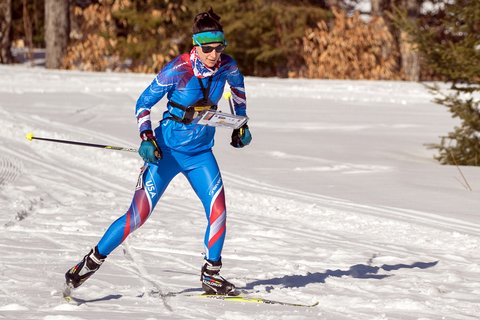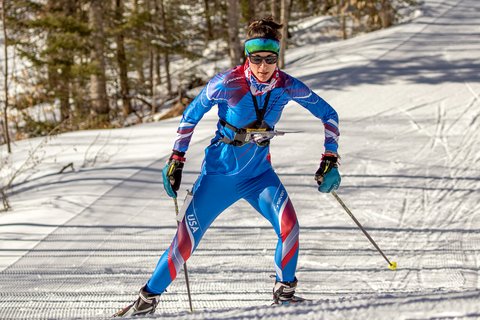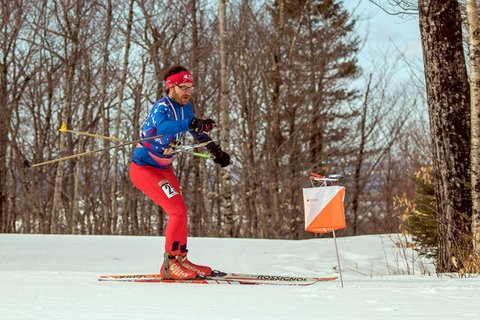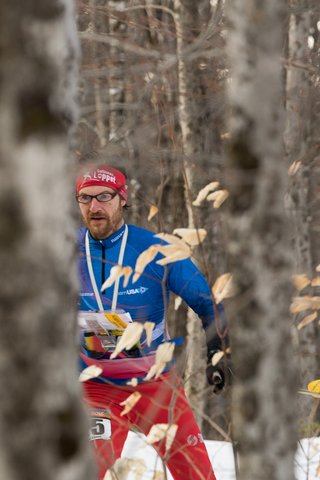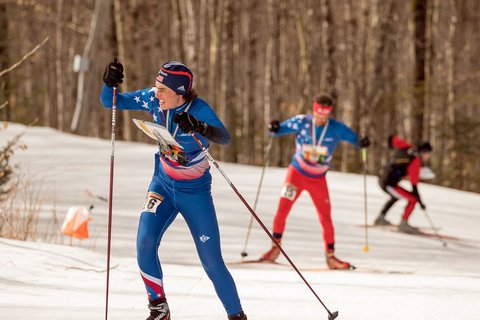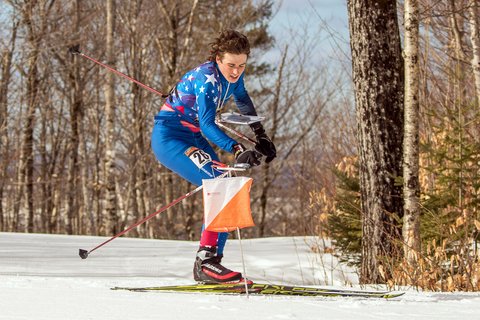Craftsbury Skiers Podium at Ski-Orienteering Championships
Head to head: 2 generations of Owens compete in the long distance race at US Ski-O Nats.
Editor's Note: big thanks to Allison Van Akkeren for sharing this race report and photos with us.
On the weekend of March 11-13, Adrian and Kestrel Owens were joined in Presque Isle, Maine by Melanie Sergiev to vie for North American championship titles in Ski-Orienteering (Ski-O) and potential starting spots on next year’s US team. They competed with 40 skiers from Canada and the United States in a different distance race each day, all of whom were greeted by good conditions in Northern Maine. The three Craftsbury skiers had never skied at Presque Isle before, and like the other racers were not allowed to see or ski on the trails before the races.
Friday afternoon’s warm, soft snow was the setting for the Sprint with an interval start. The sprint was just under 3 miles in length at a minimum, but the exact length depended on the route each skier choose for themselves to most efficiently reach each control point on the map in the specified order. The map was handed to each racer 15 seconds before the start. The men had a slightly longer course than the women.
Adrian Owens was fastest among men, 16:19. Second place was Jonis, a Lithuanian skier (he was a top contender each day, but was not eligible for the North American titles), with Kestrel third in 17:34 (Kestrel raced as a senior for better points). Other US and Canadian racers filled in the senior men’s field. “It was a dense trail network with lots of junctions and cut-throughs that came up faster than I could read the map sometimes”, Adrian said. “I skied one short cut through the woods, and later took off my skis to run a steep downhill through brushy woods between trails.” Kestrel described the closely packed trails as “spaghetti” making it hard to tell which trail you were on. “The sloppy snow made for slow skiing”, he added.
Melanie (also racing as a senior) finished her Sprint race in second place 16:55, behind Alex Jospe 14:43 of Watertown, MA who has been on the US team since 2007. Other Senior team racers finished third and fourth.
The snow froze overnight into a firm crust, but it was softening again in the Saturday morning sun when the first starters got their maps and headed out on the trails. Kestrel decided to race one category down for the long distance which was advertised to be at least 22 kilometers for the senior men. His 17 km course was shared with the senior women, and he was 20 seconds faster than Alex Jospe, who was once again the fastest women. Melanie slipped to third woman behind Anna Voegele of Truckee, CA. Kestrel said he felt really good skiing, “but purposefully slowed down after a fast start to pace myself.”
In the men’s long race Adrian was fastest again 1:16:46, edging out Jonis by 27 seconds. Both the senior men and senior women courses required three maps. The route on the first map ended at a map exchange area where a second map was picked up for the continuation of the race. “That kept us guessing on how much farther we had to go, but also allowed for a longer course”, Adrian said. “By the third time leaving the biathlon stadium area I was starting to know the trails pretty well.” The third map ended up being a much shorter loop than the previous two.
The crust was harder on Sunday and did not soften up during the wave start Middle Distance races. The main trails were machine groomed but the smaller trails were pure ice. Kestrel lined up with the senior men, including his father Adrian. The course was set up with “route forking” and two maps so while each athlete would end up skiing the same total distance, they wouldn’t visit the controls in exactly the same order. “The forking right from the start was good to make you do your own route finding instead of being able to follow people,” explained Kestrel. “But many legs brought the racers back together for head-to-head racing. You could see how you were doing.”
Kestrel had a good start and was in the lead for the first six controls, until the Jonis passed him with a better route choice to the seventh. Adrian trailed and lost contact due a map reading error going to control 10 instead of number 5. “Once I realized the mistake the best correction I could make was bushwhacking through about 300 meters of forest, and lost almost a minute”, he explained after the race. “I skied extra hard after that and eventually caught up to Kestrel, but could not pass him on the narrow trails near the finish.”
Kestrel said, ”when I saw how short the second map was and my Dad so close behind me, I skied it at full sprint.” Jonis finished in 37:47. Kestrel grabbed the North American championship gold with a time of 38:41, while Adrian had to settle for silver in 39:03. “I am really proud of Kestrel for coming in ahead of me in a big race”, admitted Adrian.


